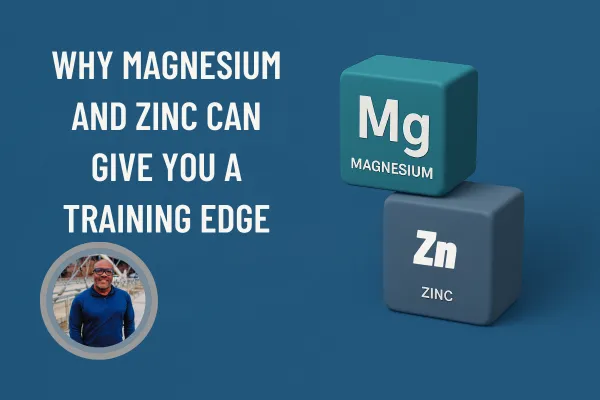
Micronutrients and Muscle Growth
Why Magnesium and Zinc Are Your Secret Training Edge
When it comes to building muscle, most people think of two things: lifting heavier weights and eating more protein. But new science says there’s another piece to the puzzle—micronutrients, particularly magnesium and zinc.
A 2025 study published in the Archives of Gerontology and Geriatrics used advanced genetic analysis to show that magnesium and zinc levels directly influence lean muscle mass, strength, and mobility. If you’re serious about results—whether it’s adding muscle, improving performance, or aging strong—this is breakthrough information you need to know.
The Science Behind the Study
Researchers analyzed genetic data from thousands of people using a method called Mendelian randomization. Unlike traditional observational studies, this approach reduces bias and gets closer to identifying cause-and-effect relationships.
The study focused on five key physical traits often linked to sarcopenia (age-related muscle loss):
Grip strength
Physical activity levels
Walking pace
Ability to walk or cycle for 10 minutes unaided
Adjusted lean muscle mass (especially in the limbs)
They also looked at seven essential nutrients:
Magnesium
Zinc
Calcium
Iron
Selenium
Phosphorus
Omega-3 fatty acids
What They Found
Magnesium Builds & Protects Muscle
People with higher magnesium levels consistently had more lean muscle and better muscle retention, making it a key factor in both performance and healthy aging.
Food sources of magnesium:
Leafy greens (spinach, kale)
Pumpkin seeds and almonds
Whole grains
Bananas
Dark chocolate
Zinc Boosts Energy and Movement
Zinc was linked to faster walking speed and higher physical activity, indicating it supports not just muscle tissue but energy metabolism and movement efficiency.
Food sources of zinc:
Beef and chicken
Eggs
Chickpeas and lentils
Hemp seeds
Omega‑3 Fatty Acids—A Complex Connection
Interestingly, the study revealed a nuanced finding: higher omega‑3 levels were associated with lower lean muscle mass. This doesn’t mean omega‑3s are bad—in fact, they remain critical for heart, brain, joint, and eye health and help fight inflammation, which is essential for recovery. The takeaway? Don’t stop omega‑3s—but keep them balanced with your overall diet.
Genetics vs. Diet—Which Matters More?
Some people naturally absorb and retain nutrients better due to genetics. These genetic traits can improve how well your body handles magnesium, zinc, calcium, and iron. But the study makes one thing clear:
Your nutrient levels—not just your genes—are what impact muscle health.
That means everyone has the opportunity to improve performance by optimizing nutrient intake.

Why Micronutrients Matter for Training
Low levels of magnesium, zinc, calcium, or iron can cause:
Workout fatigue
Slower recovery times
Reduced endurance
Trouble building or maintaining muscle mass
If you’re feeling stuck, sore, or run-down, it might not be your training program—it might be what’s missing from your diet.
How to Get Enough Magnesium & Zinc
Start with food—It’s the most effective way for most people to improve micronutrient intake.
Consider supplements—Especially for older adults, intense athletes, or those with dietary restrictions. Even a solid diet sometimes needs a boost.
Your Next Step: Support Your Training with Proven Supplements
Training and protein are essential, but ignoring micronutrients could stall your progress.
👉 Visit the Victory Dispensary to review our Muscle Growth Supplement Protocol—a science-backed combination of magnesium, zinc, and supporting nutrients designed to fill gaps, support recovery, and help you build stronger, leaner muscle.
Fuel smarter. Recover faster. Grow stronger.
References You Can Trust
Jia, X., et al. (2025). Causal relationships between micronutrients and sarcopenia: a two-sample bidirectional Mendelian randomization study. Archives of Gerontology and Geriatrics, 122, 105423. PubMed
Harvard T.H. Chan School of Public Health. Magnesium
Healthdirect (Australian Government). Foods high in zinc
Garrison, S.R., et al. (2023). Effects of magnesium supplementation on muscle soreness in different types of physical activities: a systematic review. J Int Soc Sports Nutr, 20(1), 1–13. PubMed
Hashimoto, K., & Takamura, M. (2020). Zinc at the crossroads of exercise and proteostasis. Frontiers in Physiology, 11, 570. PMC
Smith, G.I., et al. (2019). The influence of omega‑3 fatty acids on skeletal muscle protein turnover in health, disuse, and disease. Front Nutr, 6, 144. Frontiers
